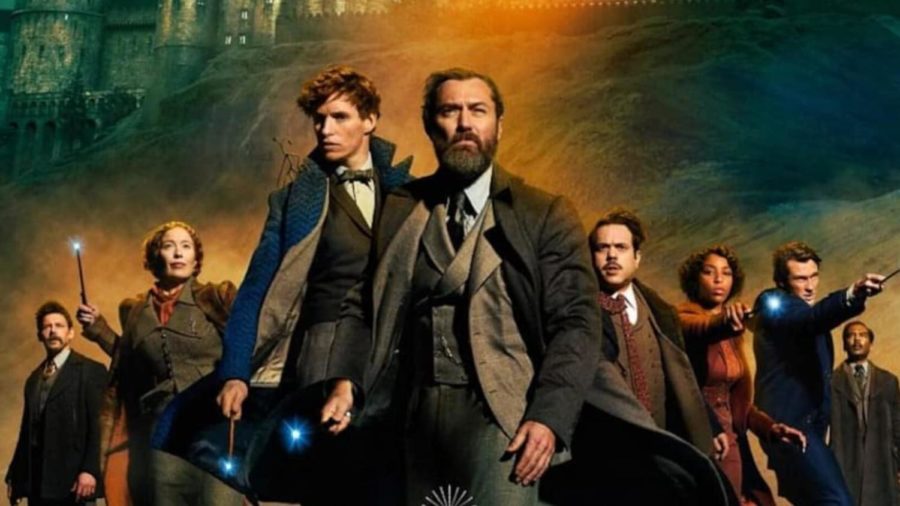“The Secrets of Dumbledore” Review
The newest Harry Potter film “The Secrets of Dumbledore” lacks both direction and meaning
The real “secret” in the newest addition to the Harry Potter franchise, “Fantastic Beasts: The Secrets of Dumbledore,” is how to pretend to enjoy a movie that’s completely reliant on nostalgia to bring in enough money to fund the remaining films in the series.
“The Secrets of Dumbledore” premiered in theaters on April 15, 2022, with a whopping two and a half hour run time—the longest movie in the Fantastic Beasts series to date. From what I’ve seen of them, the “prequels” of Harry Potter have just as disjointed and mangled a plot as the sequels to the Star Wars series.
The original film focuses on Newt Scamander (Eddie Redmayne), a former student at Hogwarts who now works with magical animals, and his friends in the American magical world around 60 years before the events of the main series as they try to contain a creature called an “obscurus” as it wreaks havoc across New York City, potentially exposing the world of witches and wizards to the non-magic folk of the area. By the end, the creature is revealed to have been manipulated by the dangerous wizard Grindelwald (Mads Mikkelsen).
“The Secrets of Dumbledore” as the third installment to the series establishes a younger Dumbledore (Jude Law) and Grindelwald’s blood pact that prevents them from dueling against the background of the political unrest as the International Confederation of Wizards looks for a new leader. It also formally brings Dumbledore and Grindelwald’s romantic relationship into the Harry Potter canon, something that had never been explored in the original writings and films under J.K. Rowling’s authorship.
This brings me to my strifes with this film, along with the entire series in general. It’s difficult in general to make a solid prequel to an established series, particularly because most of the time, it’s clear to the audience that the movie was made for money, not because it was actually necessary to the comprehension of the series. Producers can’t rely on shock value or plot twists to further the film, since most of the audience already knows how the story turns out. Therefore, prequels either have to further develop characters or plot lines that weren’t explored in the original series (or both).
The “Fantastic Beasts” series takes this point, examines it, and throws it out the window.
You would think that a series named after a (fictional) book would focus primarily on the author and main character, Newt Scamander, but somehow Newt has gotten even flatter and more two-dimensional as the series continues. Where he was boring in the first movie, he is almost lifeless by the third, moving through the plot moping about his relationship problems and complaining about his role in the plan to stop Grindelwald. He has developed as a character in retrograde while the films have slowly started to be less about Newt and more about Dumbledore versus Grindelwald.
Newt’s lack of development made it hard to emphasize and connect with his struggles throughout the film, especially since they made Dumbledore more three-dimensional. The producers should have flat out said they were going to make a sequel to Harry Potter that focuses primarily on the Dumbledore/Grindelwald conflict instead of starting out trying to blow up one of the most irrelevant tiny details into a movie. It’s also painfully obvious that the storyline, at least from the first three films, is being formulated as the movies come out without much long term organization or planning. The entire thing could have been a coherent look into a war that was mentioned throughout the books and movies as being of importance if it had been planned to be that from the beginning, instead of randomly twisting in that direction halfway through.
It’s especially disappointing because the technical elements of this movie were very well executed. The talented cast, stellar CGI work, comprehensive color palette through its use of camera filters and directing style could have been more fully appreciated if only the storyline for this film wasn’t as lacking in direction.
I can’t talk about Harry Potter without mentioning author JK Rowling’s controversial and hateful words on social media and throughout the “Harry Potter” books and movies. Already known to be completely eurocentric in her characters, with the only three Asian characters in the entire series having stereotypical names like “Cho Chang,” she has since voiced transphobic sentiments on public platforms such as Twitter. She has also tried to “backpedal” her published words, changing the sexual orientation and even the races of already established characters. The added inclusivity isn’t the issue; it’s the fact that she couldn’t have made it apparent from the beginning that Dumbledore is gay, or that Hermione could have been Black (while casting a white actress for the films).
This has obviously translated into the third installment in the “Fantastic Beasts” series, in which Dumbledore’s romantic relationship with Grindelwald is instrumental to the plot. So why wasn’t he explicitly not straight in the canon text if JK Rowling had, as she said in an interview with Time Magazine, “always thought of Dumbledore as gay”? I enjoyed what part of their relationship I did see in “The Secrets of Dumbledore,” which is why I wish it had been explored sooner in the books, movies, and sequels since it is so integral to Dumbledore’s character. If from the beginning they had stuck with a decision to make the movies about completely developing Newt’s character, or focused on the war, or focused on Dumbledore and Grindelwald’s relationship, these films would be less disjointed in nature and could have actually contributed to the beloved magical universe.

Notable Life Achievements: Awesome blueberry muffin maker. Can read a Sally Rooney book without throwing up. Has seen Before Sunrise upwards of 10 times. Lighting designed High School Musical 2 in less...



